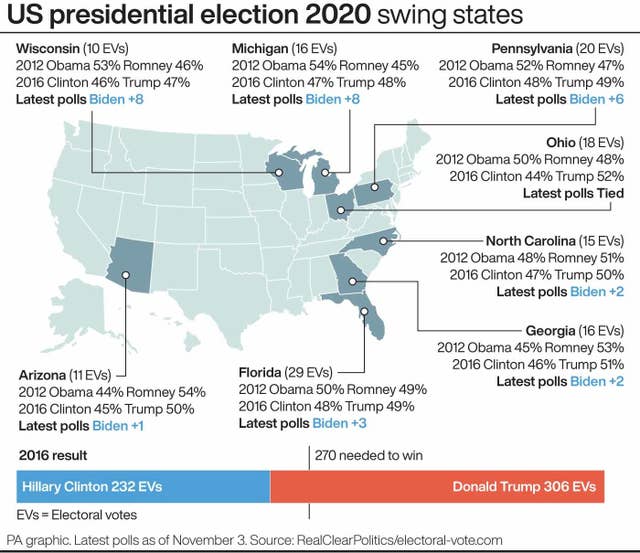
Iain Dale 7pm - 10pm
4 November 2020, 01:44

The night began with predictable victories for each candidate, with Mr Trump taking Kentucky and Mr Biden winning Vermont.
The first set of polls have closed as voters in the US election decide between President Donald Trump and Democrat Joe Biden.
Each candidate declared the other fundamentally unfit to lead a nation grappling with coronavirus and foundational questions of economic fairness and racial justice.
The night began with predictable victories for each candidate, with Mr Trump taking Alabama, Mississippi and Oklahoma and Mr Biden winning Massachusetts, his home state of Delaware and Virginia, a former battleground that has become a Democratic stronghold. It is too early to call in the battleground states of Florida and Georgia.

Millions of voters put aside worries about Covid-19 – and some long queues – to turn out in person, joining 102 million fellow Americans who voted days or weeks earlier, a record number that represented 73% of the total vote in the 2016 presidential election.
Mr Biden entered polling day with multiple paths to victory, while Mr Trump, playing catch-up in a number of battleground states, had a narrower but still feasible road to clinch 270 electoral college votes.
Control of the Senate is also at stake. Democrats need to net three seats if Mr Biden captures the White House to gain control of all of Washington for the first time in a decade. The House is expected to remain under Democratic control.
With the worst public health crisis in a century still fiercely present, the pandemic – and Mr Trump’s handling of it – is the inescapable focus for 2020.
At the White House, more than 100 family members, friends, donors and staff were set to watch returns from the East Room. Mr Trump was watching votes come in upstairs in the residence with a few close aides. Most top campaign officials were monitoring returns from a “war room” set up in the Eisenhower Executive Office Building.
Mr Biden spent the day doing last-minute campaigning in Scranton, Pennsylvania, where he was born, and in Philadelphia with a couple of local stops in Wilmington, Delaware, where he was spending election night.

The president began his day on an upbeat note, predicting that he would do even better than in 2016. But during a midday visit to his campaign headquarters, he spoke in a gravelly, subdued tone.
Mr Trump told reporters: “Winning is easy. Losing is never easy, not for me it’s not.”
Mr Trump left open the possibility of addressing the nation on Tuesday night, even if a winner had not been determined. Mr Biden had scheduled a nighttime speech from his Delaware hometown but, hours before slated to deliver it, he said: “If there’s something to talk about tonight, I’ll talk about it. If not, I’ll wait ’til the votes are counted the next day.”
“I’m superstitious about predicting what an outcome’s going to be until it happens … but I’m hopeful,” said Mr Biden, who earlier had made a last-minute pitch in the critical state of Pennsylvania. “It’s just so uncertain … you can’t think of an election in the recent past where so many states were up for grabs.”
With coronavirus surging again, voters rank the pandemic and the economy as top concerns in the race between Mr Trump and Mr Biden, according to AP VoteCast, a national survey of the electorate.
Voters are especially likely to call the public health crisis the nation’s most important issue, with the economy following close behind. Fewer named healthcare, racism, law enforcement, immigration or climate change
The survey found that Mr Trump’s leadership loomed large in voters’ decision-making. Nearly two-thirds of voters said their vote was about Mr Trump – either for him or against him.
The momentum from early voting carried into polling day, as an energised electorate produced long queues at polling sites throughout the country. Voters braved worries of coronavirus, threats of polling place intimidation and expectations of long queues caused by changes to voting systems, but appeared undeterred as turnout appeared it would easily surpass the 139 million ballots cast four years ago.
No major problems arose on Tuesday, outside the typical glitches of a presidential election. Some polling places opened late, robocalls provided false information to voters in Iowa and Michigan, and machines or software malfunctioned in some counties in the battleground states of Ohio, Pennsylvania, Georgia and Texas.

The cybersecurity agency at the Department of Homeland Security said there were no outward signs by midday local time of any malicious activity.
The record-setting early vote – and legal rows over how it would be counted – drew unsupported allegations of fraud from Mr Trump, who had repeatedly refused to guarantee he would honour the election’s result. The hard-fought campaign left voters on both sides eager to move on, although the result might not be known for days.